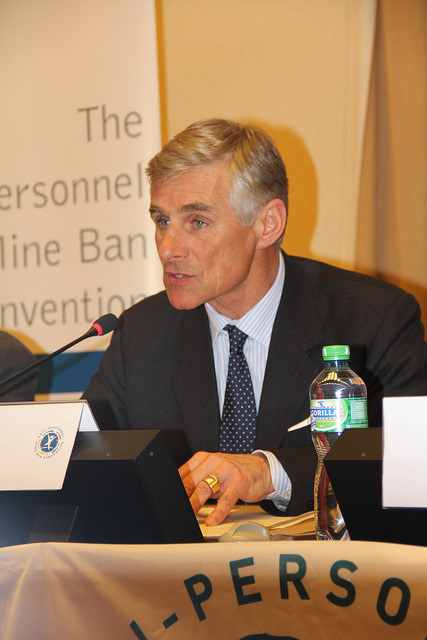01.03.2017

Convention's success, this former minefield is now free of landmines
Geneva, 1 March 2017 — The President of the international treaty banning anti-personnel mines is calling on the international community to free the world of the deadly legacy of these weapons by universally joining the Anti-Personnel Mine Ban Convention (Ottawa Convention), which today celebrates 18 years since entering into force.

H.E. Thomas Hajnoczi Ambassador of Austria to the UN in Geneva, also called on the States Parties not to let up on their efforts to meet their Convention obligations.
“Decades of sustained efforts to implement this disarmament instrument have brought upon significant progress in landmine clearance and awareness, and succeeded in stigmatizing its use by the few parties that still use them today.”
“We have seen impressive gains in the universal adherence to the Convention, on stockpile destruction and the humanitarian assistance to victims of landmines, and yet, more needs to be done,” said Ambassador Hajnoczi.
“While we have achieved considerable success, it is abundantly clear that it will take increased efforts and a continued financial commitment to ensure that the Convention lives up to its promise to end the suffering and casualties caused by anti-personnel mines.”

A group of landmine survivors in Zimbabwe
Landmine-free is not victim-free. We appeal to all countries that have the financial, material or technical resources to assist in providing adequate humanitarian assistance to landmine survivors.”
The President also thanked the States Parties and other interested stakeholders for participating on the Second International Pledging Conference for Implementation of the Convention on 28 February at the UN in Geneva.

More than 30 States and 5 international and non-governmental organizations participated in the pledging conference.
The Conference also featured the participation of H.E. Michael Linhart, Austrian Vice-Minister for Foreign Affairs (picture, left), who called on the States Parties to redouble their “efforts to reach the 2025 goal that we have set for ourselves”.
Ambassador Hajnoczi, who led the pledging conference on the eve of the Convention's 18th anniversary, reminded States Parties not to forgo their assessed contributions and comply with the financial obligations agreed to collectively, and stressed in particular the sponsorship of delegates that enables them to take part in meetings.
“Their participation is key in supporting implementation of the Convention,” said the Ambassador.
Austria was part of a core group of States that pushed for a global ban on landmines and was responsible for drafting the Convention's text 20 years ago.
The Convention is widely accepted by 162 States Parties, representing over 80% of the world's states. It was adopted and signed in 1997, and entered into force on 1 March 1999. It is the prime humanitarian and disarmament treaty aimed at ending the suffering caused by landmines by prohibiting their use, stockpiling, production and transfer, ensuring their destruction and assisting the victims.
The States Parties have destroyed more than 49 million landmines; 158 States Parties no longer have stockpile destruction obligations under the Convention.
For more information, please contact the Convention's Implementation Support Unit: isu@apminebanconvention.org